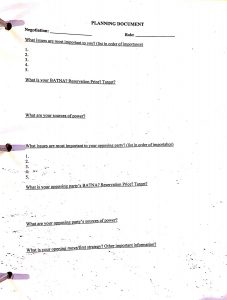Negotiation Strategy: Find the Opportunity in Differences
Negotiation Strategy: Find the Opportunity in Differences
I just completed a negotiation class at Duke’s Executive Education Center.

I just completed a negotiation class at Duke’s Executive Education Center. The money spent will surely yield multiples in return.
https://www.fuqua.duke.edu/programs/executive-education/business-negotiation-skills
Thirteen years have passed since I last took a negotiation class at the now, Fuqua Global MBA. The research and teachings have evolved. The Professor, Ashleigh Rosette, mixed practical experiences with pedagogical research to form her curriculum.
https://www.linkedin.com/in/ashleigh-shelby-rosette-a811111
Before I dive into the class, I would like to share a chat that I had with a venture capitalist who was upset that one of his companies would not agree to another company’s acquisition offer. He said to me, ‘It is upsetting because it is best for both companies to reach an agreement. But egos and greed get in the way. It’s just bad energy.’
The class theme, ‘Finding the Opportunities in the Differences’, may have been a way to solve this.
To find these differences, follow a methodical five-step process. Following the process will prevent you from glazing over subtleties and will reveal differences that will help the outcome.
Reflect Inward -> Focus Outward -> Manage Conflict ->Understand Diversity -> Negotiate
Think Inward: Deeply Understand Your Goals
Prepare systematically and reference the cheat sheet below. Know your objectives: What is your goal (best price)? Define your BATNA (best alternative to a negotiated agreement), and finally, what is your reservation price? (the price that you are indifferent between negotiated agreement and impasse). Ashleigh even suggested to write these down and take them into a meeting, but don’t disclose the numbers. It will serve as a reminder during heated negotiations.

What is your style of negotiation? Research suggest that the best way to be is positive. Believe ‘you can catch more flies with honey.’ Poker face players and negative negotiators usually lose.
Start the negotiation by getting to know each other, sharing information to build trust, and understanding each sides’ issues. Only then, make the first offer. In distributive negotiations (one variable with one party), research suggests that making the first offer can be beneficial.
Make sure to sell your points. In many cases, trained salesmen are the best negotiators because they know how to sell key points.
Focus Outward: What are Their Views?
Prepare, again. Write down what their views are and how they may negotiate. Predict their positions. During the negotiation, ask questions to test these assumptions.
Ask questions, share information, and listen! Let the other side be heard. Keenly understanding the differences allows you to address them. One of the biggest mistakes occurs early in the negotiation. Parties do not share enough information nor develop adequate trust.
In a multi-variable (integrative negotiation) there are many outcomes and ways to ‘duck-trade’. Draft the packages that may work for you. After you develop a mutual understanding, you can share the packages openly and discuss. We did this in one mock negotiation. We actually laid out the numbers in good faith – which I was initially against – and then quickly came to an agreement.
Manage Conflict: Interests, Rights, and Power
Often a negotiation occurs because of a conflict, and there can be conflict during the negotiation. When this occurs, look at issues in terms of interests, rights and power.
Interests: Learn what motivates each party and search ways to help them. (Yes, help the other party!). Hopefully, there are some different interests that parties are willing to trade-off.
Rights: Interpretation of contracts or the law is a way to influence the other. Interpretation can differ! So this provides an opportunity to understand how they view legal rights.
Power: Know the power balance and how that plays into the negotiation. Don’t make threats unless it is a last resort. Acknowledging the difference may also be an advantage.
Take a break. If a negotiation gets difficult, take time off. During that time, do not reflect on the negotiation, just relax and distract yourself so that you don’t get hyper-competitive.
Understand Diversity: Empathy Creates Trust
It is important to acknowledge assumptions and mediate misunderstandings. Cultural values may differ in many ways such that ways of communicating – direct (USA) or indirect (Japan) – may influence the discussion. Confront diversions quickly otherwise you may go down a black hole.
To understand someone else’s perspective, write down what they may actually be feeling and say it aloud. I found this to be more effective than the proverbial ‘put yourself in someone else’s shoes.’ Once a person can feel that you understand them, they will often be more flexible to get a deal done.
Negotiate: Close the Deal
By this time, trust has developed and differences understand. The negotiation becomes smooth and sometimes even FUN. Here are some tips to consider.
1. When you make an extreme opening, back it up with justifications. If you get anchored, re-anchor quickly! Otherwise, you will be working off the extreme offer. If someone anchors and then moves away largely, maybe they weren’t serious.
2. Give information to get information. Then, you can understand if your assumptions were right or wrong. The More trust, the more likely for a positive outcome.
3. It is all about how you frame the discussion. Use reference points, status quo (what you have now is the norm) and unilateral concessions (gifts) to your advantage.
4. Don’t stop too soon. Many people stop when they think they got a good deal or give up when the negotiation becomes difficult. Try to keep going.
5. Don’t be overreaching, if no bargain is struck and it could benefit all, then everyone failed.
Benjamin Franklin said, “Trades would not take place unless it was advantageous to the parties concerned. Of course, it is better to strike as good a bargain as one’s bargaining position permits. The worst outcome is when, by overreaching greed, no bargain is struck, and a trade that could have been advantageous to both parties does not come off at all
If this captures your interest, please take the course or reach out to Ashleigh! The money spent will certainly pay off multiples in your next deal.
